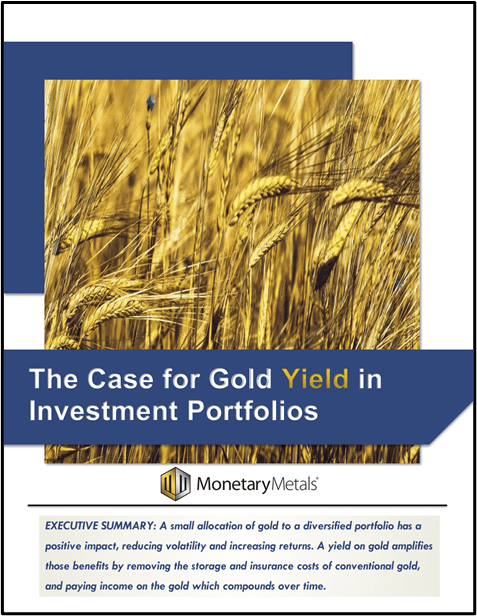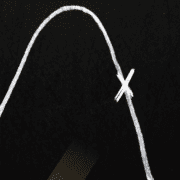Gold, Redeemability, Bitcoin, and Backwardation
I recently released a video about the Internet-based currency, Bitcoin. I asked the question: is Bitcoin money? In brief, I said no it’s an irredeemable currency. This generated some controversy in the Bitcoin community. I took it for granted that everyone would agree that money had to be a tangible good, but it turns out that requirement is not obvious. This prompted me to write further about these concepts.
A human being has a physical body with physical needs, and lives in a physical world. He produces that he may eat and clothe and shelter himself. Once civilization develops beyond subsistence, men specialize to increase their production. Each relies on others, who specialize in other fields. Each trades his products for the goods produced by others.
A problem arises, called the coincidence of wants. One man produces food and another produces leather moccasins. When the moccasin producer is hungry, the food grower may not need new shoes. Mr. Moccasin must discover that some goods are more marketable than others. He can trade less-marketable moccasins for more-marketable salt, for example. He may not need the salt (though he can always use it) but he knows it is accepted in trade for food and other goods.
Eventually, a market process finds the most marketable good. It becomes even more marketable due to its increasing use as money (but it does not lose the attributes that made it useful in the first place).
People accept the monetary good in trade because it fills one of three needs. They will exchange it for something else later. They may want it for its own sake. Or they may accumulate a hoard during their working years so that in retirement, they can dishoard to pay their bills.
Modern civilization layers a complex financial system on top of the monetary good. It has bills, bonds, and savings accounts, etc. Most people do not want to redeem most paper credit instruments, for reasons of convenience and the preference for an income. However, it is important to keep in mind that the possibility of redemption is necessary and essential to a working financial system. Everyone must choose for himself the right balance between holding the monetary commodity directly and various earning assets that promise to be redeemed in a quantity of the monetary commodity in the future.
Only this balancing process can perform one particular and critical function. Hoarding, also known as managing risk, has played a vitally important role throughout human history (and which is almost unappreciated by the economics field). Hoarding and investing are balanced by risk tolerance. In a free market without central banking and bailouts, everyone must think of risk.
To the economist, redemption of paper and hoarding of the monetary good, serve to police and clean the system, force the write-offs of bad credit (as opposed to letting them accumulate), and of course empower the saver to enforce his interest-rate preference. This last, is a point that I have not seen anyone make prior to Professor Antal Fekete, and which is under-appreciated today.[1]
To the hoarder himself, hoarding looks and feels very different. He is thinking of having something tangible in hand. A coin in his pocket does not have a risk, it can be carried anywhere, and can be accumulated in a safe place. To anyone aware that he is living in the physical world, there is no substitute to having a physical, tangible commodity.
Today, of course, legal tender laws obscure most of the above. The monetary commodity is not allowed to do its job, and we’re lucky that after they removed it from the monetary system they at least once again legalized its ownership for American citizens. Even so, most people regard owning gold as a risky speculation because its dollar price is volatile. It’s madness.
Returning to the question of Bitcoin, we have a conundrum. Bitcoin is not debt. In that sense, it is like gold—there is nothing to redeem because the thing is the final good. Unlike gold, it is not a tangible good. You cannot hold it or stack it in a safe in the floor. Other than the value you hope it has in trade, it has no utility by itself.
Bitcoin in this context is like an attempt to reverse cause and effect. Gold is money because people strongly desired it for its physical properties and then, subsequently, discovered that it was the most marketable good and thus useful as money. Bitcoin bypasses this and attempts to go straight to being money. Should hackers break its cryptography, the Internet go down for a few months, or any number of other scenarios occur, the above logic will reassert itself.
Owning Bitcoin is to be in a partially completed transaction. Until it is exchanged for a tangible good in another trade, the owner of the Bitcoin is in the position of having given up something tangible for nothing in return.
I made the point, in a previous video that redemption is not the same thing as purchasing the monetary commodity. Prior to 1933, one could go to any branch bank of the Federal Reserve and exchange dollars for gold. This was not “buying” gold, but redeeming the dollars. One accepted the dollar bill in trade, with the sure and certain knowledge of the terms (e.g. gold value) of redemption. Unlike then, today the dollar can be used to buy gold. But there is no way to know the terms—or indeed if one can even make the purchase at all—until one attempts the transaction.
It is the same with Bitcoin.
Now that I have used Bitcoin as the foil to establish several points, let’s look at the dollar and its ability to buy gold. Consider the following points that I discussed at greater length in this video:
- irredeemable debt-based currency provides no way to extinguish a debt
- the dollar itself is a debt instrument
- payment in dollars merely transfers the debt
- all debt is borrowed at interest
- eventually, the interest cannot be paid out of income
- the only way to pay the interest in aggregate is further borrowing
- total debt in the system grows exponentially until it cannot
The system is designed to drive all participants to bankruptcy! “This is,” as they say in technology industries, “a feature, not a bug”.
In this light, the problem is not the rising quantity of dollars per se (though endless issuance by the Fed is certainly not good) but its falling quality. It is all headed to default when the debtors cannot borrow any more. This point was reached in Greece, but it is years away in the United States.
One might be tempted to ask why the banks and financial institutions don’t recognize this and refuse to do business in dollars. The answer is that they are regulated, they ultimately answer to investors who believe in dollars, and they are given perverse incentives to continue to play the game. For example, they can borrow short at near zero from the Fed, and lend long at near 2% to the Treasury. This transaction creates no wealth, but the banks engaging in it earn “profits”. They are fat, dumb, and happy to make this spread and many others like it.
So who understands it? The lowly gold hoarder does. His challenge is that he is sometimes distracted by the mainstream message that gold is a risky commodity that cannot be used to buy bread. He is often distracted by the goldbug message that the rising gold price is a “profit” (and the falling price is a conspiracy). If he can see through these two mirages, then he can see that all the credit in the system must inevitably and inexorably crash to earth like too many rocks impossibly kept aloft for a while by a juggler who exceeds his limited skill.
“Money is gold and nothing else,” as JP Morgan famously said in testimony before Congress. When bad credit eventually is repudiated, gold will still endure.
This is the context to my argument: permanent gold backwardation is a late symptom of the terminal monetary disease. Like jaundice in a cancer patient, signaling to the doctor that the patient is in immediate risk of death by liver failure, permanent backwardation signals to the economist that the monetary system is in immediate risk of death by gold withdrawal.
The dollar is not strictly redeemable, but it can still be used to buy gold. This provides an “escape valve”. Those who wish to convert their irredeemable paper into the monetary commodity, to complete the transaction of trading their product for dollars and dollars for the monetary commodity, can still do so.
Backwardation is when the price of a commodity in the futures market is lower than the price in the spot market. Anyone who has the commodity can make a profit by simultaneously selling the commodity in the spot market and buying a future to recover his position. This trade has no price risk, credit risk, or even spread risk. The only risk is default. Permanent backwardation is when all futures contracts fall below the spot price, and the gap keeps widening no matter how much the price rises.
The existence of now-chronic temporary backwardation, is proof that gold owners are starting to become reluctant to trust the dollar system, and the lure of profit is insufficient. If they do not trust the delivery of a future, then they have to question if they will be able to buy gold on any terms. In an environment of collapsing credit and bankruptcies, this lack of trust will be quite well founded.
The final stage is brought on by the complete withdrawal of offers to sell gold for dollars (i.e. the gold bid on the dollar). Collapse will come swiftly because of asymmetry. While no gold holder will then want dollars, some dollar holders will desperately want gold. They will buy any goods that have a gold bid. The trade of dollars > commodities > gold will drive the prices of commodities up to any arbitrary level in dollar terms, and down nearly to zero in gold terms. Oil could become $1,000,000 per barrel and 0.0001 gold grams per barrel at the same time. This process will continue until sellers of commodities will no longer accept dollars.
The dollar is fiat, which means imposed by force. It is debt-based, which means its value derives from the efforts of the debtors to continue to pay. And it is irredeemable which means there is no way for debtors, in aggregate, to get out of debt, and no way for creditors to know the terms by which they can get gold. The government uses force to impose the contradiction of a debt-based currency that cannot extinguish debt. People would not accept it otherwise!
The final resolution of such a contradiction is total collapse.
For those interested in tracking the backwardation occurring in both gold and silver right now, Monetary Metals publishes the Last Contango Gold Basis Report (free registration required). Monetary Metals publishes The Last Contango: Gold Basis Report weekly (free registration required).
[1] http://www.zerohedge.com/news/antal-fekete-responds-ben-bernanke-gold-standard
Speak to one of our Relationship Managers to see how we can help you diversify your portfolio earning a yield on gold and silver.
Additional Resources for Earning Interest on Gold
If you’d like to learn more about how to earn interest on gold with Monetary Metals, check out the following resources:
In this paper we look at how conventional gold holdings stack up to Monetary Metals Investments, which offer a Yield on Gold, Paid in Gold®. We compare retail coins, vault storage, the popular ETF – GLD, and mining stocks against Monetary Metals’ True Gold Leases.
The Case for Gold Yield in Investment Portfolios
Adding gold to a diversified portfolio of assets reduces volatility and increases returns. But how much and what about the ongoing costs? What changes when gold pays a yield? This paper answers those questions using data going back to 1972.








You say bitcoin is an irredeemable currency. I don’t think that concept applies to bitcoin.
Why is being redeemable a good thing? To protect from inflation or default.
Bitcoin is a deflationary currency and has no counterparty risk.
Redeemability is therefore irrelevant.
“it is years away in the United States”
You might be right, but how can you be sure of this?
JR: It’s a tricky thing and no guarantees. :-/
That’s what I thought you would say.
You also say “It’s madness”. Yes it is…. madness to attempt to measure madness.
I concede that gold may be in backwardation when the madness finally ends but that doesn’t explain the madness, nor how long the madness will last, or mad the madness will ultimately be.
I find it interesting that a child of the Internet age such as yourself objects to the intangible value that can be abstractly represented in the BTC.
Do you not see the value of a new piece of software? Even though it is intangible in form and for the most part a representation of an idea via computer code, just ask Bill Gates if windows is tangible. I think it may be the same with BTC. Intangible yes, but solving problems and helping the little man to throw off his yoke even though it is intangible, maybe. The market seems to be saying that it does something well. Maybe just giving people a chance at having money out of the hands of bankers and governments is that valuable. Sad to me that people have not recognized the exact same attributes in the precious metals in quite the same way.
tyonker, measuring the value of something is not the same as saying something has value.
tyonker: if you follow my commentary from my first video on bitcoin, I state explicitly that I think it’s cool technology that enables commerce that would otherwise be impossible. It is a currency with some desirable features that are not available with any other currency.
That said it is irredeemable currency, not money. This is not saying that it has no value, it is saying that it is not a commodity.
I would disagree that software is indeed a tangible thing. It goes into a computer, laptop, tablet or smartphone which enables its user to utilize this device to support a variety of businesses, functions for services, production or consultation.
As usual, I never come to this site without learning some new nuggets from Keith and sometimes its commentators.
This quote is magnificent:
“…then he can see that all the credit in the system must inevitably and inexorably crash to earth like too many rocks impossibly kept aloft for a while by a juggler who exceeds his limited skill.”
AGREED!!!!!!!!!!!!!!!!!!!!!!!!!!!!!!!!!!!!!!!!!!!!!!!!!!!!!
then there is this
http://www.businessinsider.com/texas-family-we-sold-this-porsche-last-night-for-300-bitcoins-2013-4
tangible enough for some
Sorry for being off topic.
I would love to buy physical gold, but i live in an unsafe area and vunerable to theft. I see the writing on the wall about the US dollar and the only way i can protect myself is with IAU eft in my 401k.
I know this is not the same, but its all i can do. Im worried but i dont know what else to do, so i put 50 percent in IAU and hope for the best.
Well put, Keith. Excellent analysis.